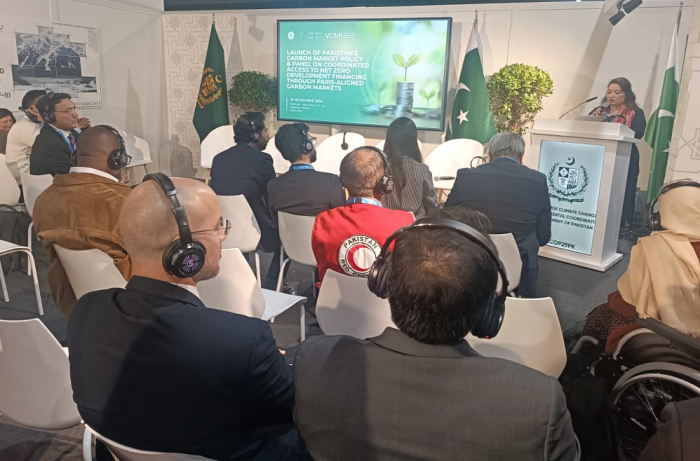“Let me say this confidently that Pakistan is now ready to lead, innovate, and collaborate with local private sector as well as international partners for the development of carbon markets to attract investments in green initiatives for achieving climate goals under the Paris climate pact,” she announced while addressing a high-level event ‘Launch of Pakistan’s Carbon market Policy & Panel on Coordinated Access to Net Zero Development Financing Through Paris-Aligned Carbon Markets’ held here at Pakistan Pavilion on the sidelines of COP29 global climate conference in Baku.
By participating in such markets, Pakistan can incentivize businesses and industries to adopt cleaner technologies and practices, she said.
Carbon markets provide a platform for trading carbon credits, which represent a reduction or removal of climate-altering greenhouse gas (GHG) emissions. These markets operate on the principles of "cap-and-trade" systems or credit-based mechanisms, allowing entities to buy, sell or offset their emissions.
"This launch is just the beginning. The government of Pakistan is fully committed to supporting the development of this market, ensuring it becomes a cornerstone of our climate strategy and a catalyst for sustainable development," she told the participants of the launching ceremony, which was attended by members of international civil society organisations, delegation members of different countries, academia, researchers, policymakers and media.
The PM’s climate aide also said that the intended establishment of a robust carbon market mechanism would align well with Pakistan's commitment to the Paris Agreement, enabling the country to monetise its emissions reductions while supporting sustainable development and climate action through investment in various adaptation and mitigation-related initiatives.
Explaining about the nature of possible carbon markets in Pakistan, the PM’s climate aide told the event participants that Pakistan aims to accelerate clean technology deployment and attract investment in sectors and projects with significant emissions reduction potential, including energy, agriculture, waste management, and forestry.
Inviting local, regional and international potential partners interested in development of carbon markets in the country, Romina Khurshid Alam said,“We are also ready to work together with partners and collaborators interested in jointly setting up carbon markets to make this national carbon market policy not just functional but transformative, paving the way for a more sustainable and resilient future and win-win situation for the country and those interested to constructing the carbon markets."
"The success of Pakistan’s carbon market will depend on collaboration—within our borders and across them. We welcome partnerships with international investors, organizations, and governments to ensure that this market becomes a regional and global success story,” she highlighted during her keynote address.
The PM’s climate aide Romina Khurshid Alam highlighted that a regulated and transparent carbon pricing compliance market (CM) and voluntary carbon market (VCM) in Pakistan would invite the private sector to jump in and pitch greenfield projects based on climate resilience and adaptability.
However, we would be more focused to draw the benefits of COP29 collectively for the nations, who are emitting less through cooperation and collaboration in the carbon market crediting, she added.
Addressing the event, Secretary of the Climate Change and Environmental Coordination Ministry in her opening remarks said that Pakistan’s Carbon Market Policy is an outcome of two-years rigorous hardwork and a framework designed to operationalize carbon markets as an important mechanism for meeting Pakistan’s climate and development objectives.
This policy guidelines set a clear regulatory framework for the creation and governance of both voluntary and compliance carbon market activities in Pakistan, following international requirements and good practice,” she added.
The climate change ministry secretary said that through this policy, the country aims to accelerate clean technology deployment and attract investment in sectors and projects with significant emissions reduction potential, including energy, agriculture, waste management, and forestry.
The guidelines, she hoped, would help ensure that carbon markets drive real, verifiable reductions while generating substantial economic and social co-benefits across Pakistan.
“By launching this policy, Pakistan signals its readiness to engage in global carbon markets, inviting both domestic and international partners to join us in advancing a resilient, low-carbon economy with strong accountability and impact at its core,” the ministry secretary Aisha Humera Moriani underlined.
The ministry secretary also emphasised that today the world stands at the critical juncture in its collective response to the global climate crisis.
“As the global community gathers here at the COP29 global climate summit, we all are reminded of the urgency of our climate action – a mission that transcends borders, unites diverse communities, and demands bold, decisive action for the sake of our present and future generations,” she said.
AzVision.az
More about: Azerbaijan COP29 Pakistan
















































